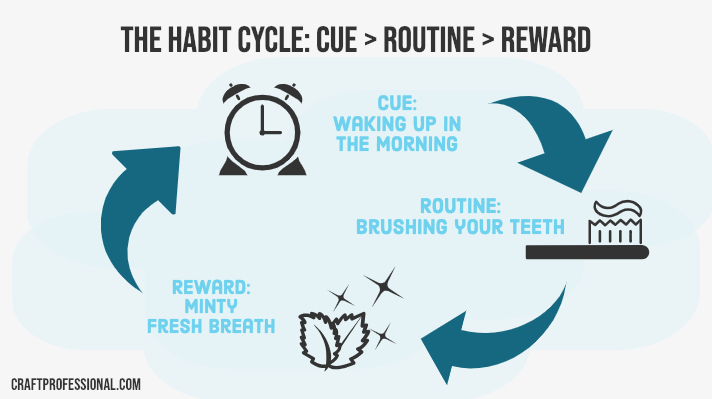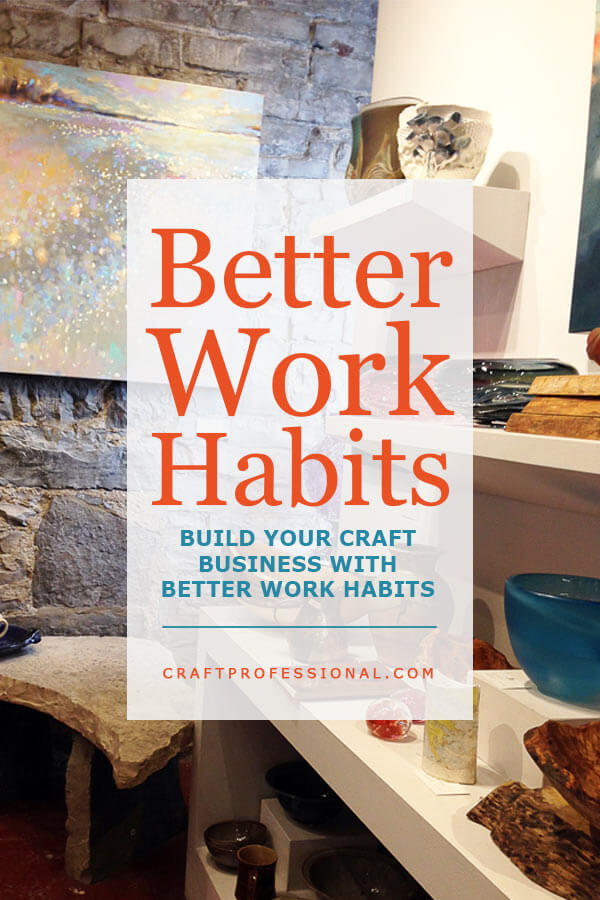Effective Work Habits to Help You Grow Your Craft Business
Develop effective work habits, and you can get 45% of your work day right automatically, without even thinking about it.
Imagine that!
Almost half of your day could naturally go exactly as you'd like. You could work toward creating the type of life and business you want without the need for a whole lot of decision making and willpower.
Sounds great to me.
Hard to Believe? Sounds Too Good to Be True?
It's shocking to think that a full 45 percent of our actions are done out of habit, but that's exactly what a study out of Duke University Study published by David T. Neal et al. shows us.
And when I start to think about my own life and everything I do each day, there really is a lot that I do automatically and completely on autopilot.
That's why I've been reading a lot about and practicing cultivating habits in a purposeful way. I'm convinced that cultivating certain habits, and ending others, is the key to achieving goals.
If I can develop effective work habits that allow me to get 45% of my day right automatically, that represents a whole lot of potential for positivity and productivity.
I earn a commission for purchases made through links on this page.
To learn more, please see my disclosure.
What is a Habit, Exactly?

Before we dive into the ways effective work habits can help you achieve your business goals, let's define exactly what a habit is.
We can all point to examples of habits.
Brushing your teeth in the morning is a habit. You do it without any thought. You don't have to make a decision about whether you'll do it or not, and you don't have to think through the mechanics of the routine. You just do it, and when you're done, you enjoy the minty fresh feeling in your mouth.
But how do you break a habit down into its basic components?
A habit is a formula in your brain. The formula for all kinds of habits goes like this:
- When I encounter a specific cue (waking up in the morning),
- I will do a certain routine (brushing my teeth),
- which will give me a reward (a minty fresh feeling).
Habits are a kind of shorthand that allow you to work through routines without too much need for thought or decision making.
How Will Effective Work Habits Help Build My Business?
Imagine spending almost half of your work time automatically doing what you need to do to build your business.
Imagine, if you could just cultivate the right habits, you could automatically live and work they way you want at least 40% of the time.
No thinking about what you need to do. No negotiating in your mind to make yourself do jobs you don't love. No procrastination.
Want to build your Instagram following? Develop the habit of posting every day on a regular basis and interacting with others on Instagram.
Perhaps you:
- set an alarm to ring three times a day at optimal times (your cue)
- post on Instagram and engage with other Instagram users for five minutes each time the alarm rings (your routine)
- and enjoy the satisfaction of seeing your Instagram followers and engagement rise each time you check your account (your reward).
That strategy is going to be a whole lot more effective than approaching the growth of your business on Instagram haphazardly, posting and engaging when you think of it and when you feel like it.
Build Consistency
There are all kinds of routines and tasks that, if done consistently, will contribute to the growth of a business. You could:
Find More Time to Work
Getting up an hour early every day to work on your business will give you an extra 7 hours of uninterrupted work time. Of course, getting to bed at a reasonable hour goes hand in hand with that habit.
Improve Your Creative Skills
Working on your craft daily - perhaps sitting down in your work space every day after supper - will help you build skill, develop products, and create inventory.
Build a Social Media Following
Social media sites all have their specific best practices, but any social media presence you want to build can be boiled down to engaging with the community well on a regular basis at optimal times. Make that a daily habit, and you'll be well on your way to building an online presence for your business.
Feel More Focused and Energetic
Physical activity helps you feel more focused and energetic. Going out for a daily walk, or getting up from your work space and walking around once an hour - whatever makes you feel your best - can help you concentrate better and make the most of your work time.
Can't Make a Habit Stick? Maybe You're Not Using the Right Strategies.
You can turn any of those tasks into habits, but they have a much greater likelihood of sticking and becoming habits if you use scientifically proven strategies to purposely great a habit.
If you want to build a habit of waking an hour earlier, just saying you're going to get up an hour earlier each day won't be enough for most. Instead, use the cue - routine - reward formula to establish a habit.
According to Charles Duhigg, author of The Power of Habit, with that formula, you'll vastly increase your chance of success.
Got Some Bad Habits You Want to Break?
Sticking with a new routine can be tough at first. Breaking a bad habit is even tougher.
If you start to research habits, you'll quickly come across the idea that bad habits are replaced, not eliminated. That means you'll have more success ending a habit if you replace your routine with a different routine.
You need to figure out the cue that causes you to engage in the bad habit, and understand the exact reward you're getting from the habit. It isn't always easy to figure these things out. Sometimes it takes a little experimentation.
Once you know what cue triggers the bad habit, and what reward you're getting from that habit, you need to find a different routine to replace the habit - something you can do when you encounter the cue that gives the same reward but doesn't have the negative consequences of the habit you're trying to break.
That strategy takes a little more planning, but researchers have shown it has a much greater chance for success.
So, if you have some bad habits that you know are dragging down your business, don't aim to eliminate them. Instead, understand them, and aim to replace them with a more helpful routine that provides the same reward.
Putting Theory to Work
I'm working on cultivating a few new habits - things I do already but not with the degree of consistency I'd like. That's my current, overall goal: Develop more consistency with the things I know are helpful and productive, and do what needs to be done even when I might not feel like it.
In the summer, I found a lot of helpful strategies in Gretchen Rubin's Better Than Before. Combined with these new insights I've gained from reading Charles Duhigg's The Power of Habit, I feel well prepared to build consistency and effective work habits.
What I appreciate about Duhigg's strategies is that they aren't just actions that have worked for a single person. His strategies are backed by loads of research and shown to work for all kinds of people working on all kinds of habits.
I like that.
A lot.
If you tell me to do a thing, I may or may not do it. But if you give me evidence that it's right, and effective, I'm far more likely to do it.
If, for example, you say I should find a partner who will hold me accountable to completing my weekly business-related tasks, I might find a partner. Or I might not.
But if you tell me why I need to find an accountability partner, and give me evidence that your advice is likely to work, I’m far more likely to follow through.
Gretchen Rubin, another habit management expert, calls that kind of approach to habit forming "questioner" behavior.
So, when I read Duhigg's account of all the research that shows change happens when you're embedded in a social group that supports your effort to change, I immediately found social support for habits I want to build.
Give me a plan, back it up with some evidence that your plan is likely to work, and I am far more likely to follow through.
What Will Your Work Habits Bring Into Your Life?
Are you ready to start actively developing habits that will build your business?
If 45% of your day is governed by habits, that’s a whole lot you can get right if you commit to cultivating good habits and eliminate bad habits.
Use good, research-backed strategies to make your habits stick, and you could, in time, gain control of almost half of your day. You'll already be almost half-way to doing what you need to do to achieve your goals and live the way you want automatically.



New! Comments
Have your say about what you just read! Leave me a comment in the box below.